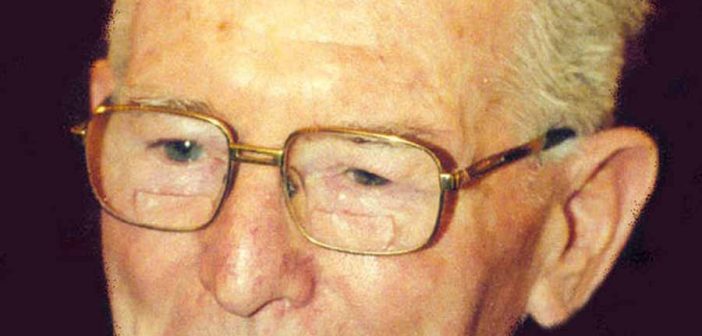
Brendan O’Regan was born on 15 May 1917 in Sixmilebridge, County Clare, the fourth of seven children of James O’Regan and Nora (née Ryan). His father, a prominent local businessman and former chairman of Clare County Council (1906–1915), managed several enterprises including the Old Ground Hotel in Ennis. Brendan began his education at the local national school in Sixmilebridge, before attending Blackrock College in County Dublin, where he participated in rugby and hurling.
Between 1936 and 1938, he studied hotel management in Lucerne, Switzerland, and gained experience working in hotels across Wales, Bavaria, and London. In 1938, his father leased the Falls Hotel in Ennistymon, Co. Clare, bringing Brendan home to manage the property.
Terry Clavin’s biography notes that “his low-key efficiency revived an elegant establishment, leading members of the Stephen’s Green Club to recruit O’Regan for their ailing Dublin haunt where he spent several months in 1943 improving the club’s fare and finances and impressing two important members, the minister for industry and commerce, Seán Lemass and the secretary of Lemass’s department, John Leydon. In December 1943 they made him manager of the restaurants at the seaplane base in Foynes, Co. Limerick, and the nearby landplane base at Rineanna, Co. Clare, employing him as a private contractor with the right to one-quarter of the profits.”
Driven to showcase Ireland positively to international visitors, O’Regan fused continental culinary sophistication with traditional Irish fare, elevating Irish catering standards above much of postwar Europe. Renowned for his focus on presentation, he encouraged culinary creativity, exemplified by Joe Sheridan’s 1944 invention of Irish coffee, whiskey-laced coffee crowned with cream.
Following the closure of the Foynes base in 1946, operations moved to Rineanna, soon renamed Shannon, which from 1945 to 1955 handled half of all North Atlantic flight traffic. There, O’Regan launched extensive ventures, including in-flight catering services, a passenger bar, and a 200-bed hotel. By 1950, a seasonal team of 300 staff served 3,000 meals daily. He established Ireland’s first catering school in 1951, which became the Shannon College of Hotel Management. Despite operating a costly round-the-clock service to meet unpredictable flight schedules, generous American tips helped maintain staff morale.
Inventor of duty free shopping
A pivotal shift came in the late 1940s with the creation of a kiosk inside the terminal, which evolved into a key dollar-generating enterprise. Starting in 1947, O’Regan lobbied for duty-free retail privileges, launching a store for Irish crafts in 1949. By 1950, after agreeing to limit his commission to 5pc, he gained approval to sell duty-free liquor and cigarettes, initially to crew and then to passengers. American allowances caused sales to skyrocket, rising from $29,000 in 1950 to $500,000 by 1955.
In 1950, the shop expanded to sell foreign goods, eventually evolving into a fully-fledged duty-free department store stocking luxury products such as French perfumes, Swiss watches, and German and Japanese cameras, sold at competitive prices. Shannon held its distinction as the world’s sole duty-free airport store until the early 1960s, remaining under O’Regan’s centralized management.
By 1955, his Sales and Catering division generated $1.75m, 20pc of Ireland’s dollar exports. That year, his income reached £6,000, climbing to over £20,000 by his retirement. Although he had initially resisted unionisation, prompting a sudden strike in 1951, he later encouraged union membership and employee input, fostering workplace harmony and enhancing the duty-free concept.
Shannon tax free zone
With technological advancements threatening Shannon’s viability in the late 1950s, O’Regan was appointed in October 1957 by Lemass to lead efforts to revitalise the airport. He and his team innovated rapidly, holding informal brainstorming picnics and launching campaigns to attract industry and tourism. He envisioned a duty-free export zone near the airport, based on his 1958 visits to Panama and Puerto Rico. Legislation followed, offering tax exemptions, subsidized factory space, and customs-free transport for foreign companies using Shannon.
O’Regan spearheaded American-targeted promotions, emphasizing Ireland’s gateway to Commonwealth markets. In January 1959, the Shannon Free Airport Development Company (SFADCo) was founded, with O’Regan as chairman. His close ties with Lemass and other officials helped SFADCo navigate governmental rivalries and establish itself. He proactively constructed factories before securing tenants and accepted riskier ventures to build momentum.
Criticism of early, short-lived investors waned after Standard Pressed Steel arrived in 1960. By 1966, the industrial zone had attracted £6m in foreign investments, employed 3,000 people, and generated 30pc of Ireland’s manufactured exports, though 81pc of export value came from imported materials. Eventually, low-skill roles gave way to better-paid work in electronics and finance. O’Regan even assisted Taiwan in 1962 with a similar initiative, while SFADCo staff advised other countries on free zone management.
In response to commuting challenges, SFADCo initiated Ireland’s first purpose-built town since the 18th century. Construction began in 1960, despite opposition and insufficient funding, limiting growth to 3,000 residents by 1970, far below O’Regan’s projected 25,000. By then, rising car ownership had diminished the need for such centralized housing.
Declining transit traffic between 1957 and 1965 hurt catering revenues, but was offset by the booming mail-order business O’Regan had started in 1954. By 1965, nearly half of duty-free sales were mail-based. As chairman of Bord Fáilte Éireann from 1957, and having joined its board in 1955, he helped stimulate tourism. With Tim O’Driscoll as director general, O’Regan introduced incentives for hotel construction and attracted Irish-American investors to build five hotels in the Shannon area between 1959 and 1964.
Bunratty castle
Between 1957 and 1960, SFADCo and Bord Fáilte played instrumental roles in restoring Bunratty Castle, a project spearheaded by Brendan O’Regan in collaboration with his close associate John Hunt (1900–1976), with whom he shared a deep appreciation for history and art. In 1964, the two also opened an Irish folk village adjacent to the castle.
Believing strongly in the appeal of Irish heritage tourism for American visitors, O’Regan began hosting medieval-themed banquets at Bunratty Castle in the summer of 1962. These events, expertly promoted through an SFADCo-run office established by O’Regan in New York later that year, became a major draw for U.S. tourists. He replicated the concept at other locations, including Dún Guaire Castle in County Galway (leased), and Knappogue Castle in County Clare, which was refurbished with the support of a wealthy American benefactor.
This cultural initiative helped drive a surge in tourism to the Shannon region during the 1960s. By 1966, 257,000 of the 470,000 passengers arriving at Shannon Airport were choosing to disembark, a dramatic change from the 1950s, when nearly 90pc remained in transit.
From 1957 onward, O’Regan began stepping back from day-to-day operations at Sales and Catering. With a strong management team in place at SFADCo by the mid-1960s, he remained chairman while delegating executive authority. By 1970, he oversaw more than 1,000 employees in Sales and Catering and another 200 at SFADCo. He focused primarily on high-level policy and select personal projects, while also seeking more time with his family. He had married Rita Barrow of Preston, England, in 1950, and together they raised two sons and three daughters. Initially residing in Ennis, they later moved to a lakeside estate in Killaloe, County Clare.
Decline of influence
Though raised by a religious skeptic and agnostic into middle age, O’Regan later embraced the spiritual teachings of Jesuit philosopher Pierre Teilhard de Chardin, becoming an earnest, ecumenically minded Catholic. He championed social, cultural, and religious causes, including the revival of the Irish language, though he never became fluent himself. His persistent advocacy for such causes, along with his steadfast support of state-led initiatives, contributed to a perception that he had become out of step with contemporary attitudes.
O’Regan’s influence began to wane after the mid-1960s, especially following the retirement of his main political ally, Seán Lemass, and Ireland’s broader pivot toward open economic policies. SFADCo’s funding was reduced amid growing skepticism from civil servants and state agencies. In 1968, SFADCo was tasked with regional development in Counties Limerick, Clare, and North Tipperary, but internal rivalries with the Dublin-based civil service and the Industrial Development Authority (IDA) impeded its progress.
His position weakened further from 1969 due to conflicts with the IDA and Aer Rianta, coupled with a sharp drop in tourism and employment at the industrial estate during the U.S. recession and the onset of the Northern Ireland Troubles. In December 1972, O’Regan was informed that Sales and Catering would be absorbed into Aer Rianta. He negotiated an annual, inflation-indexed pension of £5,000 and resigned from both Sales and Catering and Bord Fáilte the following year. He continued as SFADCo chairman, and in 1973–74 turned his focus to expanding the agency’s international consultancy work. He successfully lobbied the Irish government to establish DEVCO (State Agencies Development Cooperation Organisation), serving as its founding chairman from 1975 to 1978.
Beginning in the mid-1970s, O’Regan pushed for SFADCo to shift away from its industrial focus and become a community development organization serving the Gaeltacht. Though supported by Minister for the Gaeltacht Tom O’Donnell, his proposal was not backed by SFADCo management. After the newly elected Fianna Fáil government rejected the plan in 1977, he stepped down as chairman in 1978, staying on the board until 1985.
Cooperation North
Long committed to cross-border collaboration, O’Regan founded Cooperation North in 1978, a non-political group promoting peace through economic, educational, and cultural exchange between Northern and Southern Ireland. In 1985, he founded the Irish Peace Institute, followed a year later by the Centre for International Cooperation, which attempted, unsuccessfully, to transform Shannon into a hub for global trade fairs and conferences.
After relocating to Newmarket-on-Fergus, Co. Clare, in 1993, he founded the community group Obair. He moved again in 1999 to Malahide, Co. Dublin. His contributions were widely recognised: he was made a freeman of Limerick in 1995, received a CBE from the English queen in 1993 for his peace efforts, and was awarded honorary law degrees by the National University of Ireland (1978), Queen’s University Belfast (1999), and the University of Limerick (2002). Brendan O’Regan passed away on 2 February 2008 while visiting his daughter in England and was laid to rest in Drumcliffe Cemetery, Ennis.
Through his development of duty-free shopping at Shannon and his visionary expansion into the industrial zone, O’Regan demonstrated that Ireland could prosper not by zealously guarding its sovereignty, but by leveraging it. His Shannon enterprise became both a symbol and testing ground for Ireland’s adaptation to globalisation, offering a uniquely Irish expression of soft American power in tourism and multinational industry.




